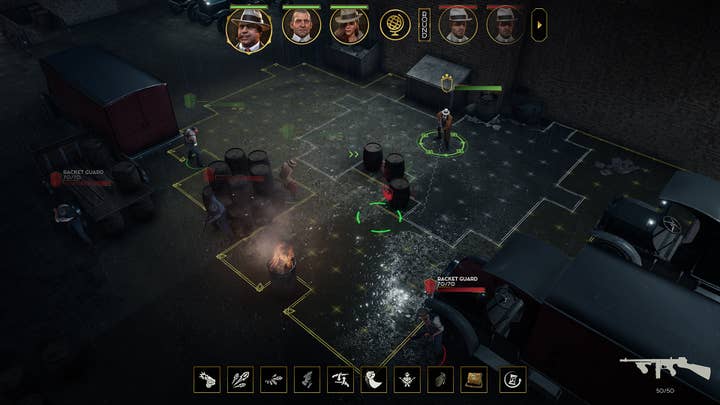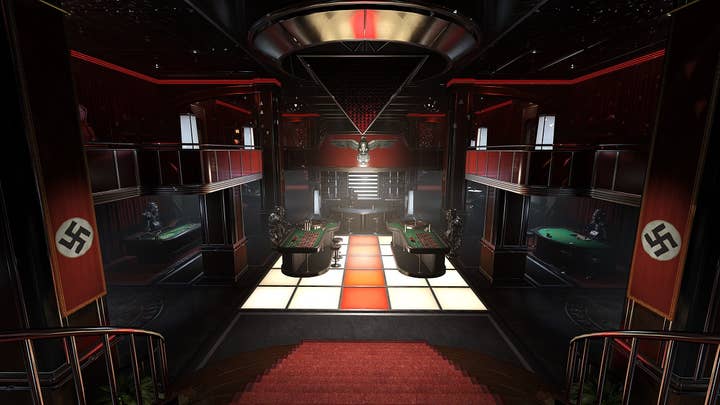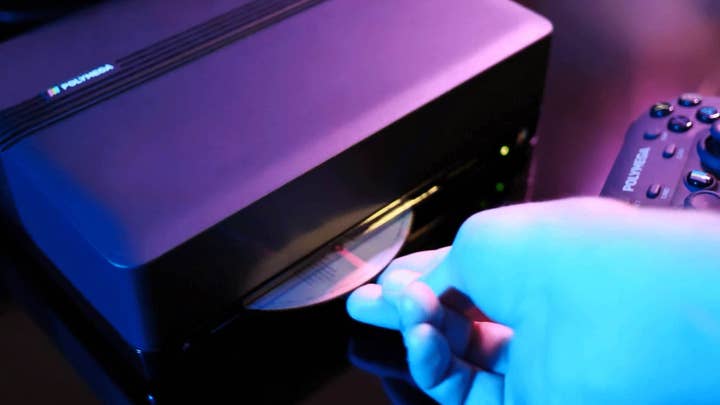Sega letting movie makers make the movie
DLC: Sega explains handling of Sonic film, John Romero gets the Paradox bump, Wolfenstein dev talks politics in games, and retro console Polymega wants to work with pubs
From time to time, there are interesting bits from our interviews that don't really fit well into the rest of the story, but are still worth reporting. Rather than relegate them to the trash bin of unpublished work, we'd like to repackage them into columns intended to provide additional insight on a variety of topics. While the exact format of these columns will change from entry to entry, we will publish them under the banner of 'DLC.'
The Sonic the Hedgehog film has been far more controversial than expected. Fans rebelled after getting their first look at the character's cinematic treatment in a trailer earlier this year. Shortly after, the film's director announced Sonic would be redesigned and the project was pushed back several months as a result. With the franchise hedgehog in an unscheduled pit stop, we asked Sega Europe COO and president Gary Dale at E3 about the decision to go back to the drawing board at such a late date.

"I think everybody's just keen to do the right thing," Dale said. "Obviously we have a very deep knowledge of the character and the brand. [Paramount] has a very deep knowledge of how to make movies. The trick is just to bring those two skillsets together to make the best film we can. To be fair, Paramount has been open to listening to feedback from the community around Sonic, which of course has got such a tremendously loyal fanbase with people with very specific views of who Sonic is, how Sonic should behave, how Sonic should look. And I think Paramount has taken a lot of that on board."
With companies like Activision, Sony, and Ubisoft bringing more of their big screen adaptation efforts in-house, we ask Dale if Sega has similar aspirations to carry more of the load in bringing its own brands to feature films.
"I don't really think so," Dale says. "I think the opportunity with Sonic is a particular situation for that film. And I think there's a view here that we're very good at making video games and Paramount is very good at making pictures... This is a film. I think the idea that you try to control Paramount would be the wrong approach. But at the same time, for Paramount not to take into account our views on Sonic would also be wrong. I think we're looking for a creative partnership that gets the best film. And over the years, I look at the success of game franchises in film and it's very mixed. The idea that games makers can control the process and create great movies... I don't know if that's true or not."
The Romero-Paradox name recognition paradox

John Romero was a key creative talent behind the seminal first-person shooter Doom, a blockbuster success and notorious boogeyman of concerned parents and politicians for decades. He is one of the handful of people in this industry who has had reason to seriously consider the question, "If they made a movie about you, who would you want to play you?"
Paradox Interactive is a publisher of strategy games, successful but not necessarily well known outside of its target market. If one were to compile a list of the top 25 publicly traded gaming companies in the world (as Newzoo recently did), Paradox would not appear on it. (Unless you want to count the 5% stake held by the top company on that list, Tencent.)
But when we speak with Romero at the Electronic Entertainment Expo for his upcoming game Empire of Sin, the name he seems most excited about having attached to the project is Paradox's.
"They have an amazing player base that loves every game they come out with," Romero says. "It's almost like when somebody loves Nintendo games, if a Nintendo game comes out, they're going to get it, because they might be doing something new or different but it's going to have that quality. We feel that when we infuse this game into the family of Paradox Games, that their players will see this and know this is balanced like other Paradox games. It'll be really interesting and they know what to expect, that's it's going to have the same quality and detail those games are really known for."
The mention of Nintendo is apt, as Empire of Sin will be a rare Paradox title for Switch, and represents another important step in the company's attempts to branch out beyond its core PC market. As such, the development team is doing its best to ensure it makes a good first impression for a new audience of potential customers.
"As we're developing the game, it's on the Switch every day," Romero says. "We develop milestones on every platform. It's not like we're going to port the thing to the Switch. We're making it on the Switch while we make it on all the platforms. We're working on the Switch to make sure it's fast, it's performant, that it handles memory the right way, and that it's not like we have a bunch of work to do after we get the game done to get the Switch working."
Correction: This article originally stated Empire of Sin would be Paradox's first game on the Switch, based on product listings on the official Paradox Interactive website. However, the company's Cities: Skylines arrived on the Swtich last year.
Should developers shy away from politics?

AAA developers love to have their games tap into anxieties and interest about current events to make them more relevant and interesting to a prospective audience. They are decidedly less enamored with offering any coherent insight or message on those events, or being perceived as having a political component.
The Wolfenstein franchise has been something of an exception to that rule, as the games and their marketing have leaned very hard into the really-shouldn't-be-controversial stance that Nazis are bad. So when we spoke with Wolfenstein: Youngblood executive producer Jerk Gustafsson at E3, we asked him whether there was a political message to the game.
"No, but of course it's in some way political since we have Nazis in the game, right? In a way, it also has a political message because for us and how we portray the Nazis, Hitler and the Nazi regime is the evil of the world. They've taken over the world, and they have been pushed back to some extent in this game, but they still symbolize what is evil and you are the protagonist who fights that evil. So in that sense, it's political because it's a message about freeing the world from that evil."
However, that doesn't mean Gustafsson and the developers started by thinking about the message they wanted to make and then worked backward from that to determine what the game would be.
"There are many things you can say are political nowadays. But when we write the stories of our games, we don't really think about it as a political message. We just write the story we want to tell. But we don't shy away from it if we notice that there are elements of [politics] in there. And hopefully that goes for other games as well."
Is the industry cool with Polymega?

One of the coolest things we saw at E3 was the Polymega retro gaming console, a $300 all-in-one emulator that runs original PlayStation, Sega CD, Sega Saturn, TurboGrafx CD, and NeoGeo CD games. The company also sells $60 modules that let you plug cartridges for the NES, Super NES, Genesis, and TurboGrafx-16 in there. And for the sake of convenience, users can copy their games to the hardware so they don't have to find space by the TV for hundreds of cartridges and jewel cases and constantly swap things out.
As Polymega CEO and co-founder Bryan Bernal explained to us, "This system is primarily made to give you a way to back up your classic games into a beautiful user interface that gives you a nice system you can play in your living room. In the future, what we'd like to do is graduate this up into a more digital-based offering where you can get access to these games through partnerships we have with publishers through a [Polymega] games marketplace."
If he ever wants to see that vision realized, Bernal knows he needs to stay on the good side of IP holders in the industry, many of whom have taken a dim view of emulators in general and any kind of back-up mechanism in particular. The FAQ on the Polymega site says the system doesn't support loading ROM files onto it specifically because the company hopes to have a legitimate storefront for classic games without facilitating piracy. It's clear Bernal wants to build bridges with the industry, but it remains unclear if that sentiment is reciprocated.
"We spent almost the entire first year of the product in deep legal research to make sure that we're not doing anything we're not supposed to do," Bernal said. "In terms of the hardware manufacturers, I haven't had conversations directly with Nintendo. Right now we feel like we're not even on their radar. We're just trying to make a great system for people to be able to play their games. But we know we're doing everything in the correct order."
However, having the law on one's side isn't always enough. Courts repeatedly sided with Bleem nearly two decades ago when the company released a PC emulator for original PlayStation games, but the company cited the protracted legal battles as a major contributor to its demise when it shut down in November of 2001.
As of E3, Polymega had logged 3,000 preorders. The system is expected to launch this year.
